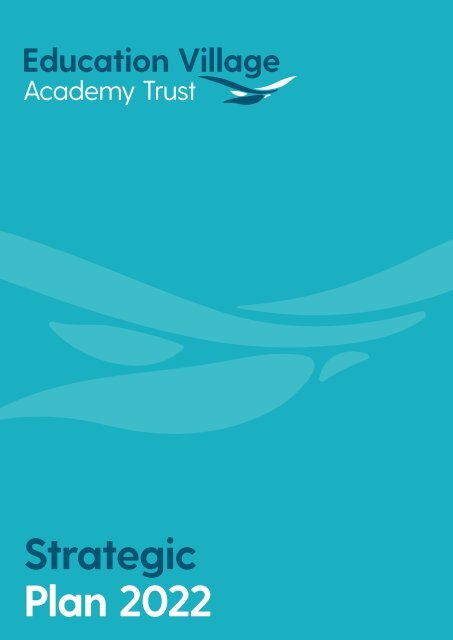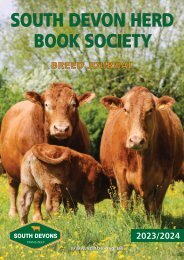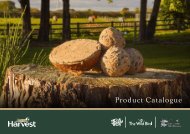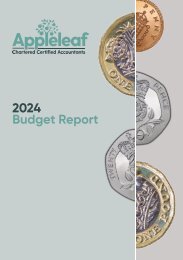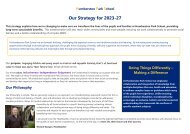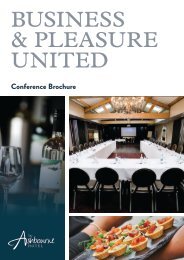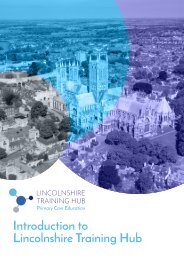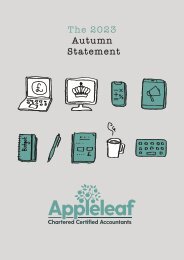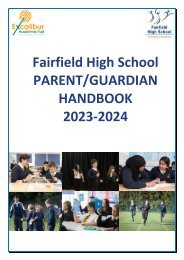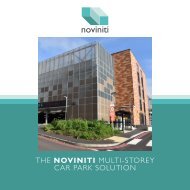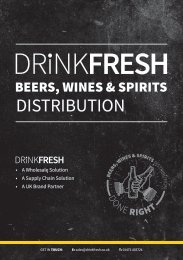Education Village Academy Trust Strategic Plan
Create successful ePaper yourself
Turn your PDF publications into a flip-book with our unique Google optimized e-Paper software.
<strong>Strategic</strong><br />
<strong>Plan</strong> 2022
Introduction<br />
Established in 2006, the <strong>Education</strong> <strong>Village</strong> <strong>Academy</strong> <strong>Trust</strong> (EVAT) is a Multi-<strong>Academy</strong> <strong>Trust</strong><br />
(MAT) made up of 5 academies and schools in the borough of Darlington:<br />
Haughton <strong>Academy</strong> -<br />
a mainstream secondary school providing education to pupils aged 11 to 16 years<br />
Beaumont Hill <strong>Academy</strong> -<br />
a specialist provider of education to children and young people with special educational needs and/or disabilities aged<br />
2 to 19 years<br />
Springfield <strong>Academy</strong> -<br />
a mainstream primary school providing education to pupils aged 4 to 11 years<br />
Gurney Pease <strong>Academy</strong> -<br />
a mainstream provider of education to pupils aged 2 to 11 years<br />
Marchbank Free School -<br />
a specialist provider of education to children with social, emotional and mental health difficulties aged 4 to 11 years<br />
We provide education and support to over 1600 children and young people in Darlington and neighbouring areas,<br />
and our mix of mainstream and specialist provision across all phases is unique. We’re an impactful <strong>Trust</strong> with extensive<br />
experience of improving schools and academies to achieve “good” Ofsted ratings.<br />
2
Background, vision,<br />
ethos and mission<br />
EVAT was founded on the principles of<br />
inclusivity, diversity and fairness, and today,<br />
those principles continue to be fundamental<br />
to our delivery of exceptional learning<br />
experiences.<br />
Our schools have diverse backgrounds and contexts, and<br />
they all serve different cohorts of pupils, some of whom<br />
are incredibly able and talented, and some of whom<br />
have very high levels of special needs. Being different<br />
and diverse is our strength, and it drives our success in<br />
improving provision across the <strong>Trust</strong> and beyond.<br />
We use our diversity to blend and enrich the learning<br />
experiences we provide, share our learning environments,<br />
ideas and perspectives and work as one community<br />
and one team. We’re proud that our children and young<br />
people are part of a truly inclusive <strong>Trust</strong> in which fairness in<br />
opportunity and acceptance of difference enhances their<br />
understanding of the world and prepares them for the<br />
future.<br />
Our priorities for the next five years are to:<br />
• Provide exceptional learning experiences and maximise<br />
outcomes for our children and young people<br />
• Build an even stronger <strong>Trust</strong> – fit for the future, with<br />
firm financial foundations and scalable structures and<br />
systems<br />
• Grow the <strong>Trust</strong> strategically and sustainably and with<br />
the core purpose of extending our reach to improve<br />
the educational outcomes and life chances of more<br />
children and young people in Darlington and beyond<br />
• Be more aware of our impact on our natural<br />
environment and create a passion for its protection and<br />
sustainability in our pupils and staff; reduce our carbon<br />
footprint; and create more exciting spaces in which to<br />
learn and work<br />
Our vision is simple:<br />
The <strong>Education</strong> <strong>Village</strong> <strong>Academy</strong><br />
<strong>Trust</strong> is a place where learning has<br />
no limits<br />
Our mission is to deliver exceptional learning opportunities<br />
to all of our children and young people. We stretch<br />
aspirations and aim to inspire everyone who learns and<br />
works with us to reach high and achieve their potential.<br />
Our ethos is inclusive and child centred. We work to:<br />
• Create a nurturing and friendly atmosphere and<br />
provide an environment where everyone feels valued<br />
for who they are<br />
• Bring out the best in every child and young person and<br />
meet the full range of their individual needs<br />
• Provide different and unique experiences, challenges<br />
and activities<br />
• Show tolerance and respect for each other<br />
• Prepare our children and young people for lifelong<br />
learning<br />
• Improve the life chances of every child and young<br />
person we serve<br />
3
Context<br />
When developing our strategic plan, we’ve<br />
considered the environment we’re operating in:<br />
• Post-pandemic, the education sector will continue to<br />
deal with the disruption to learning and impact on<br />
outcomes, social development and mental health<br />
caused by numerous lockdowns and other absences<br />
• Additional funding has been provided to support catch<br />
up, support pay rises and deliver targeted training to the<br />
workforce, but costs continue to rise in relation to pay<br />
bills, energy and other resources<br />
• The Government has published its plans to reform the<br />
school system in the White Paper: Opportunity for All;<br />
and the SEND and Alternative Provision (AP) Green Paper,<br />
which set out plans for ensuring a stronger and fairer<br />
school system that works for every child. The White<br />
Paper also makes clear the Government’s intention that<br />
all schools will be part of a strong MAT by 2030<br />
• Recruitment to the education sector increased during<br />
the pandemic. However, there are indications that an<br />
increasing number are starting to leave the sector, citing<br />
pressure due to workload, lack of job satisfaction and<br />
better opportunities in other industries<br />
• Social awareness, community values and protection of<br />
the natural environment are becoming more important<br />
and requirements are increasing for schools to work with<br />
other agencies to educate children and young people on<br />
social responsibility and environmental sustainability<br />
• Schools, academies and <strong>Trust</strong>s continue to play a crucial<br />
role in protecting children and young people from harm<br />
and educating them on the safeguarding dangers they<br />
may face inside and outside of school and the help they<br />
can get<br />
• Technology and its role in enhancing teaching<br />
and learning are more prominent as employment<br />
opportunities change for young people and learning<br />
software and devices become more advanced<br />
• The growth of MATs requires more sophisticated<br />
governance infrastructures to drive the integration of<br />
schools into new and existing structures and secure their<br />
continuous improvement<br />
4<br />
EVAT is well positioned to meet these challenges and<br />
capitalise on opportunities:<br />
• The <strong>Trust</strong> has a strong school improvement offer, with a<br />
track record in driving transformation and improvement<br />
in schools and academies, as proven in our Ofsted<br />
ratings<br />
• Our ethos is clear - our school system is inclusive,<br />
fair and works for every child. We’re central to local<br />
community and we’re well placed to work with key<br />
partners to embed community values and create a<br />
passion for the protection of the natural environment in<br />
our children and young people<br />
• We are well practiced in directing resources and<br />
funding towards the pupils who need them the most.<br />
Our safeguarding approach is well embedded. We will<br />
continue to target pupils who need help to ensure they<br />
are not disadvantaged by time lost in the classroom due<br />
to Covid, and are supported to achieve their potential,<br />
build resilience and develop critical life and employment<br />
skills<br />
• Our financial position is strong, and we have plans<br />
in place to manage rising costs to protect our longterm<br />
financial health, enabling us to invest more in<br />
continuously improving the teaching and learning<br />
experience<br />
• EVAT is developing a people strategy, with a view to<br />
creating a unique people offer to attract, develop, retain<br />
and inspire talented staff members to make their career<br />
with the <strong>Trust</strong><br />
• We are modernising our technology across the <strong>Trust</strong><br />
to reduce workload, increase efficiency, engage pupils<br />
and provide tools to support exceptional teaching and<br />
learning outcomes<br />
• The <strong>Trust</strong> has a strong and ambitious Board of <strong>Trust</strong>ees<br />
and <strong>Education</strong>al Standards Committees (ESCs), with a<br />
clear vision for the future of EVAT and a wide range of<br />
skills and expertise to help us realise that vison. Regular<br />
reviews of governance and its effectiveness are planned<br />
to underpin growth plans
Our plan for 2027<br />
We have a bold vision for the future. By 2027,<br />
we aim to have achieved four ambitious<br />
objectives, which are to:<br />
• Create and deliver exceptional learning experiences for all<br />
• Build a strong <strong>Trust</strong> – fit for the future<br />
• Grow our <strong>Trust</strong> sustainably, strategically and with a<br />
moral purpose to extend our reach and to improve the<br />
educational outcomes and life chances of more children<br />
and young people in Darlington and beyond<br />
• Have a positive impact on the natural environment and<br />
create a passion for its protection in our pupils and staff<br />
Objective 1: Create and deliver exceptional learning<br />
experiences for our children and young people. Over the<br />
next five years we will:<br />
• Develop and implement engaging curricula and<br />
pathways to unlock potential, maximise learning<br />
outcomes and equip our children and young people for<br />
the career and life they aspire to<br />
• Consolidate our approach to transformative school<br />
improvement by establishing a <strong>Trust</strong>-wide School<br />
Improvement and Quality Assurance Framework,<br />
implementing a comprehensive CPD framework,<br />
delivering a full coaching programme to embed<br />
deliberate practice, and completing regular review and<br />
assessment of teaching methods and outcomes<br />
• Enhance our use of data and use insight and intelligence<br />
to continuously improve the teaching and learning offer,<br />
support innovation in teaching practice, and secure the<br />
best possible outcomes<br />
• Strengthen our communication and relationships<br />
with parents, carers and families to ensure our high<br />
standards and aspirations for our children and young<br />
people continue at home and in the community<br />
• Bring all aspects of the <strong>Trust</strong>’s approach to<br />
safeguarding into a single framework, to further embed<br />
our safeguarding culture and ensure a consistent and<br />
well-coordinated approach to practice<br />
• Bring all aspects of the <strong>Trust</strong>’s approach to Special<br />
<strong>Education</strong>al Needs and Disabilities (SEND) into a single<br />
framework, to ensure a consistent and well-coordinated<br />
approach to practice<br />
The key outcomes we aim to achieve by 2027 are:<br />
• All EVAT schools are rated “good” or “outstanding” by<br />
Ofsted<br />
• In mainstream secondary settings, improved Progress<br />
8 scores to well above the national average and<br />
improved Attainment 8 scores to well above the<br />
national average<br />
• Primary school children meet the expected standard in<br />
reading, writing and maths<br />
• SEND pupils exceed expectations in line with their own<br />
learning pathways<br />
• Our schools are operating at capacity in pupil numbers<br />
• Destination data show more of our pupils move on to<br />
further and higher education, apprenticeships, and highquality<br />
employment opportunities<br />
5
Our plan for 2027<br />
Objective 2: Build a strong <strong>Trust</strong> – fit for the future. Over the next five years we will:<br />
• Introduce new systems and technology to streamline the services we offer schools and academies and make<br />
our business support more efficient and even better value for money<br />
• Partner with our schools and academies to promote outstanding financial and people management and<br />
ensure the <strong>Trust</strong> is financially stable and is maximising investment in learning<br />
• Redesign our people offer to make sure it reflects wellbeing, reward and recognition and underpins our plans<br />
to attract, retain and nurture the best talent<br />
• Roll out a <strong>Trust</strong>-wide technology renewal programme to: enhance teaching and learning; reduce inefficiency in<br />
processes and systems; and modernise business service functions<br />
• Review and further modernise our governance infrastructure to align it with growth plans<br />
The key outcomes we aim to achieve by 2027 are:<br />
• EVAT is operating efficiently and is proactively managing:<br />
o Teacher deployment in line with the required curriculum<br />
o Use and costs of support staff<br />
o Non-staffing costs<br />
o The balance between income and costs<br />
• Colleague satisfaction with working for and with the <strong>Trust</strong> is high; sickness absence rates are low; and retention<br />
rates are stable (in comparison with national averages)<br />
• The implementation of new technology to promote efficiency by automating processes, enabling self-service,<br />
sharing important information and data quickly and easily and reducing duplication in systems<br />
• Investment is increased in teaching and learning and the technology required to create exceptional learning<br />
experiences across the curricula<br />
• EVAT’s governance infrastructure is scalable and is strategically controlling the <strong>Trust</strong>’s decision making, financial<br />
viability, risk management and mitigations, and regulatory responsibilities<br />
Objective 3: Grow our <strong>Trust</strong> sustainably, strategically and with purpose. Over the next five years we will:<br />
• Clarify what sets us apart as a <strong>Trust</strong> to schools and other <strong>Trust</strong>s who may be interested in joining EVAT<br />
• Promote awareness of our ethos and approach and establish our reputation as being a <strong>Trust</strong> which can be<br />
relied upon to drive transformation and improvement, and achieve the best possible outcomes for learners<br />
• Further develop relationships and networks with the community, other <strong>Trust</strong>s and academies, and regional/<br />
national organisations to raise our profile and awareness of our unique offer and enhance learning and<br />
development opportunities for learners<br />
• Align our values, identify risks to our ambitions and develop a plan and framework to guide potential<br />
collaborations, support working at pace and ensure we make informed decisions about growth<br />
• Access funding opportunities to grow the <strong>Trust</strong> and boost our long-term capacity to grow<br />
The key outcomes we aim to achieve by 2027 are:<br />
• The <strong>Trust</strong> has grown to include 10+ schools (or to serve 7,000+ pupils)<br />
• EVAT is influencing local, regional and national decision making and is part of major sub-regional, regional and<br />
national bodies and groups, contributing to policy making and strategic planning<br />
• The <strong>Trust</strong> uses its strong relationship with its communities and local public and private sector organisations to<br />
enhance its curricula and create exciting learning and work opportunities for pupils and young people<br />
• The <strong>Trust</strong> is routinely accessing a range of significant funding opportunities to enhance its capacity to grow and<br />
support other schools, academies and trusts to improve their provision to good and outcomes for learners<br />
6
Our plan for 2027<br />
Objective 4: Have a positive impact on the natural environment and create a passion for its protection and<br />
sustainability in our pupils and staff. Over the next five years we will:<br />
• Be sector leaders in contributing to environmental sustainability and tackling climate change<br />
• Actively engage our children and young people in improving and protecting our natural environment and<br />
making it more sustainable for the future through new learning and work experience opportunities<br />
• Reduce our carbon footprint by adapting our buildings and introducing renewable energy and smart<br />
technology solutions<br />
• Embed environmental sustainability impact assessments into our procurement processes to ensure we are<br />
responsible and conscious of the effect we have on the environment when we buy resources, provide food,<br />
manage our waste and use energy<br />
The key outcomes we aim to achieve by 2027 are:<br />
• The <strong>Trust</strong> has achieved a national “Climate Leaders Award”<br />
• Progress has been made in delivering against the DfE’s ambitions for sustainability and climate change,<br />
including incorporating learning about the natural environment and sustainability into our curricula and CPD<br />
programmes and connecting work experience opportunities to green careers<br />
• We have adapted our buildings to include more renewable energy solutions, thus reducing energy costs,<br />
emissions and the <strong>Trust</strong>’s carbon footprint<br />
• More recyclable and renewable materials are used across the <strong>Trust</strong>, reducing landfill, and food waste is<br />
minimised with a concentration on a field-to-plate supply chain<br />
• Greater focus on added social value in contracts means the <strong>Trust</strong> can demonstrate its purchasing power is<br />
improving environmental sustainability, reducing the carbon footprint and emissions, and creating opportunities<br />
in the green economy<br />
7
Enablers to delivery<br />
A thriving MAT means we can do more for our children, young people and the communities we<br />
work with. To realise our ambitions, we have identified four critical enablers to our strategy:<br />
8<br />
People:<br />
We will continue to be an exciting and innovative place to work and we will develop<br />
and provide an offer to our people to attract, nurture and retain the best talent,<br />
enabling our staff to work to their full potential and maximise outcomes for learners.<br />
Identity and brand:<br />
We have a proven track record in successfully improving schools and academies.<br />
Raising awareness of our success and our unique offer is essential in achieving our<br />
growth ambitions. We will refresh our current brand and strengthen our relationships<br />
with key partners and local and regional partnerships to extend our influence over local<br />
and national policy making.<br />
Financial sustainability:<br />
By building our financial strength we will be better positioned to deliver exceptional<br />
learning experiences.<br />
We will continue to implement our plans to reduce inefficiency in our costs, systems,<br />
processes and organisational structures. This includes ensuring better value for money;<br />
and routine implementation of Integrated Curriculum and Financial <strong>Plan</strong>ning (ICFP)<br />
practices to ensure we provide the best possible curricula and make the best use of our<br />
resources.<br />
We will also introduce new, leading-edge technology to enhance teaching and<br />
learning; reduce the number of systems in use across the <strong>Trust</strong>; and, where possible,<br />
we will automate our business processes to reduce duplication and save money for<br />
reinvestment into learning.<br />
Estates and sustainability:<br />
The <strong>Trust</strong>’s estate supports all aspects of our education provision. It is essential that our<br />
physical learning environment facilitates creativity and engagement between pupils<br />
and staff. We will work with our key partners to design innovative, sustainable learning<br />
spaces that meet the changing requirements of education policy, the needs of our<br />
children and young people and respect the natural environment.
<strong>Strategic</strong> risks<br />
<strong>Strategic</strong> risks to the achievement of our objectives have been identified as part of the<br />
strategic planning process and are reflected in the actions we plan to undertake and the<br />
strategic enablers we will implement. <strong>Strategic</strong> risks to our plans include:<br />
<strong>Strategic</strong> risk<br />
People:<br />
• Retention<br />
• Wellbeing<br />
Financial capacity:<br />
• Rising costs<br />
• Inefficiency<br />
Technology:<br />
• Infrastructure<br />
• New devices<br />
Estates management:<br />
• Carbon footprint<br />
• PFI restrictions<br />
Safeguarding:<br />
Mitigation<br />
• Quality people offer and workforce strategy to attract, retain and<br />
nurture the best talent and ensure wellbeing<br />
• Introduction of new people management systems<br />
• New technology to reduce workload<br />
• Implementation of a <strong>Trust</strong>-wide finance improvement plan<br />
• Implementation of ICFP<br />
• New technology to reduce duplication in systems<br />
• Proactive financial management through real-time systems and<br />
business partnering<br />
• Outsourced managed IT service in place<br />
• Roll out of new infrastructure and devices across the <strong>Trust</strong><br />
• New systems for finance, people management and payroll<br />
• Estates management and improvement plan<br />
• Funding for estates development and sustainability<br />
• Effective <strong>Trust</strong>-wide health and safety management<br />
• <strong>Trust</strong>-wide approach to safeguarding and centralised leadership of<br />
safeguarding policies, practices and processes<br />
Progress with managing and mitigating strategic risks will continue to be regularly monitored by the <strong>Trust</strong>’s Board<br />
of <strong>Trust</strong>ees.<br />
9
Measuring success<br />
We will monitor our progress against our strategic objectives and the key outcomes we<br />
expect to have achieved by 2027. We will regularly check our performance in relation to:<br />
• <strong>Education</strong>al attainment and progress<br />
• Pupil numbers, attendance and exclusion<br />
• Parent and staff satisfaction<br />
• The efficiency of our curricula<br />
• Financial management – including the provision and analysis of monthly management accounts; pay levels;<br />
investment in academy improvement activities; and the health of the medium-term financial plan<br />
• People metrics including turnover, sickness, performance and succession planning<br />
• Estate and health and safety management including short, medium and long-term investment plans; funding<br />
availability; and health and safety issues and trends<br />
• Performance against the <strong>Trust</strong>’s safeguarding policies and processes<br />
• Addition of schools and academies to the <strong>Trust</strong><br />
10
www.educationvillage.org.uk<br />
e: admin@educationvillage.org.uk t: 01325 254000<br />
The <strong>Education</strong> <strong>Village</strong> <strong>Academy</strong> <strong>Trust</strong> | Salters Lane South | Darlington | DL1 2AN<br />
The <strong>Education</strong> <strong>Village</strong> <strong>Academy</strong> <strong>Trust</strong> is an exempt charity. It is a company limited by<br />
guarantee in England and Wales (Registered no: 7748248) whose registered office is as above.


